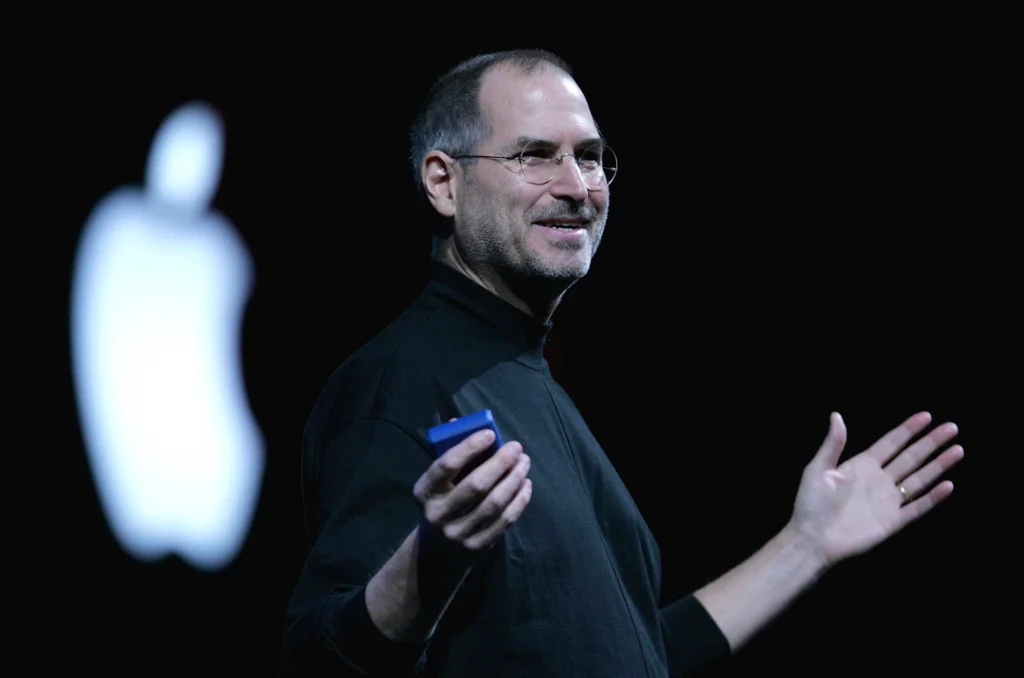Early Life and Entrepreneurial Beginnings
Steve Jobs’ early life and entrepreneurial beginnings laid the foundation for his remarkable journey as one of the most influential figures in the technology industry. Born on February 24, 1955, in San Francisco, California, Jobs was adopted by Paul and Clara Jobs. His interest in electronics and technology was evident from a young age, and he developed a passion for innovation and creativity. In high school, Jobs met Steve Wozniak, and their shared interest in electronics led to the creation of the Apple I computer in 1976. However, Jobs’ entrepreneurial journey wasn’t always smooth sailing. After being ousted from Apple in 1985, he went on to found NeXT Computer and later acquired Pixar Animation Studios. Pixar’s success, particularly with films like Toy Story, provided a significant boost to Jobs’ net worth. In 1997, Apple acquired NeXT, and Jobs returned to the company he co-founded. Through his relentless pursuit of excellence, Jobs revolutionized the technology industry with groundbreaking products like the iPhone, iPod, and iPad. His attention to detail and insistence on simplicity set Apple apart from its competitors. Despite facing setbacks and failures along the way, Jobs’ resilience and ability to learn from these experiences played a crucial role in his success. In terms of net worth, Jobs’ financial success was closely tied to his entrepreneurial endeavors. At the time of his death in 2011, his net worth was estimated to be around $10.2 billion. However, his legacy extends far beyond financial wealth, leaving an indelible mark on the world of technology and inspiring countless entrepreneurs to think differently and push the boundaries of innovation.Co-founder of Apple Inc. and the Rise of the Macintosh
After his departure from Apple in 1985, Jobs embarked on a new chapter of his entrepreneurial journey, co-founding Apple Inc. and spearheading the rise of the Macintosh computer. This phase of his career would have a profound impact on both the tech industry and popular culture.- The Macintosh was a groundbreaking product that revolutionized personal computing. Its user-friendly interface and graphical capabilities set it apart from other computers of the time. Jobs was instrumental in shaping the Macintosh’s design and functionality, ensuring that it appealed to a wide range of consumers.
- Under Jobs’ leadership, Apple experienced tremendous success with the Macintosh. Its sleek design, innovative features, and powerful performance made it a favorite among creative professionals and everyday users alike. The Macintosh became synonymous with Apple’s brand and played a significant role in the company’s resurgence.
- The Macintosh’s legacy continues to this day. Its influence can be seen in the design and functionality of modern computers, smartphones, and tablets. Jobs’ vision for the Macintosh laid the foundation for Apple’s future success and cemented his status as a visionary leader in the tech industry.
Successes and Challenges at Apple: NeXT and Pixar
During his time away from Apple, Jobs faced both successes and challenges as he ventured into new endeavors with NeXT and Pixar. NeXT, founded in 1985, aimed to create high-end workstations for the education and business sectors. While NeXT faced financial struggles and limited market success, it had a profound impact on the technology industry. The NeXT computer introduced several groundbreaking features, including the use of optical storage and an object-oriented programming environment. Though NeXT failed to achieve mainstream adoption, its operating system, NeXTSTEP, became the foundation for Apple’s macOS and iOS systems. On the other hand, Pixar, the animation studio Jobs acquired in 1986, experienced tremendous success under his leadership. Pixar revolutionized the film industry with the release of the first-ever computer-animated feature film, Toy Story, in 1995. The film received critical acclaim and became a box office hit, grossing over $373 million worldwide. This success was followed by a string of highly successful films, such as A Bug’s Life, Finding Nemo, The Incredibles, and Cars. Pixar’s achievements in storytelling and animation techniques earned them numerous Academy Awards and established them as a dominant force in animation.Return to Apple and the Revolutionary Products: Imac, Ipod, Iphone, and Ipad
Upon his return to Apple, Steve Jobs spearheaded the development of revolutionary products that would forever change the technology landscape. Under his leadership, Apple experienced a renaissance, introducing groundbreaking innovations that captured the imagination of consumers worldwide. Here are three of the most notable products that emerged during this period:- iMac: The iMac, released in 1998, marked a significant departure from traditional desktop computers. Its sleek design, vibrant colors, and integration of hardware and software made it an instant hit. The iMac revolutionized the personal computer market and set the stage for Apple’s future success.
- iPod: Launched in 2001, the iPod revolutionized the way people listen to music. With its iconic click wheel and user-friendly interface, the iPod made it easy for users to carry their entire music library in their pocket. The device became a cultural phenomenon, propelling Apple into the mainstream and laying the foundation for the digital music revolution.
- iPhone: Introduced in 2007, the iPhone completely transformed the mobile phone industry. Combining a touch screen interface, internet connectivity, and a powerful operating system, the iPhone set new standards for smartphones. Its intuitive design and vast array of apps made it a must-have device, catapulting Apple to the forefront of the mobile market.
The Accumulation of Wealth and Philanthropic Efforts
Steve Jobs’ accumulation of wealth and philanthropic efforts have been widely discussed and scrutinized, shedding light on his financial success and his dedication to giving back to society. Jobs’ wealth accumulation was primarily due to his role as co-founder and CEO of Apple Inc. Under his leadership, Apple experienced tremendous growth and became one of the most valuable companies in the world. Jobs’ net worth at the time of his death in 2011 was estimated to be around $10.2 billion. However, despite his immense wealth, Jobs was known for his relatively modest lifestyle. He famously lived in a modest house and drove a Mercedes-Benz SL55 AMG, a car known for its relatively low price compared to other luxury vehicles. In terms of philanthropy, Jobs’ approach was different from other billionaires. Unlike his contemporaries such as Bill Gates and Warren Buffett, Jobs did not establish a foundation or donate large sums of money to various causes. Instead, he focused on creating products that would have a lasting impact on society. Jobs’ impact on philanthropy can be seen through his vision of creating innovative and user-friendly products. The iPhone revolutionized the smartphone industry, while the iPad transformed the tablet market. These products not only generated significant wealth for Apple but also had a profound impact on the lives of millions of people around the world. While Jobs may not have been known for his traditional philanthropy, his dedication to creating products that changed the world ultimately had a far-reaching impact on society. His wealth accumulation and the impact of his philanthropic efforts continue to be subjects of discussion and admiration.Frequently Asked Questions
What Was Steve Jobs’ Childhood Like and How Did It Shape His Entrepreneurial Journey?
Steve Jobs’ childhood hardships, including being put up for adoption and facing financial struggles, shaped his determination and resilience. His early influences, such as exposure to technology and his interest in electronics, set the foundation for his entrepreneurial journey.How Did Steve Jobs Meet Steve Wozniak and What Led Them to Start Apple Inc.?
When Steve Jobs met Steve Wozniak, their shared passion for technology sparked the birth of Apple Inc. Jobs’ early influences and entrepreneurial journey played a significant role in their partnership and the success of their company.What Were the Major Challenges Faced by Apple During Jobs’ Tenure and How Did He Overcome Them?
As a leader, you faced major challenges at Apple during Jobs’ tenure. Through his innovative thinking and strategic decision-making, he overcame these obstacles, showcasing his leadership strategies and ability to overcome adversity.Can You Provide Details About Jobs’ Departure From Apple and His Subsequent Ventures at Next and Pixar?
Jobs’ departure from Apple was a pivotal moment. He went on to found Next and Pixar, companies that became Apple’s competitors. His leadership style, marked by innovation and attention to detail, shaped his subsequent ventures’ success.How Did Jobs’ Return to Apple in 1997 Impact the Company’s Success and What Were the Key Products Launched During This Period?
Jobs’ return to Apple in 1997 had a profound impact on the company’s success. He revitalized the culture, fostering innovation and excellence. Under his leadership, key products like the iMac, iPod, and iPhone were launched, significantly boosting Apple’s market share.Conclusion
In conclusion, Steve Jobs was not only a visionary and innovator, but also a shrewd businessman. Through his entrepreneurial ventures, particularly his co-founding of Apple Inc., Jobs amassed a significant fortune. With the success of groundbreaking products like the Macintosh, iPod, iPhone, and iPad, Jobs’ net worth grew exponentially. Despite his immense wealth, Jobs also demonstrated his philanthropic side, making significant contributions to various causes. His legacy as a tech pioneer and wealth accumulation will continue to inspire future generations.Discover more from Ghana Scoop
Subscribe to get the latest posts sent to your email.





